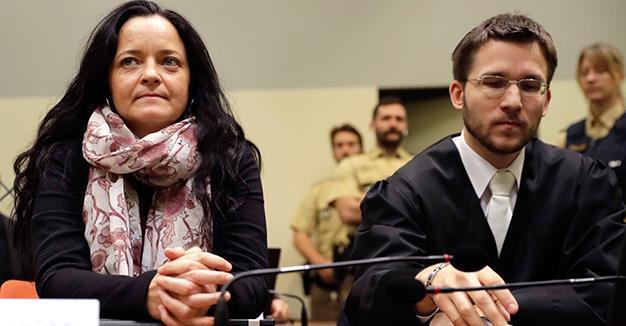Life term sought for suspect in Germany neo-Nazi murder case
BERLIN – Anadolu Agency

AFP photo
German prosecutors on Sept. 12 demanded life imprisonment for the main suspect of a neo-Nazi cell, which murdered eight Turkish immigrants, one Greek citizen and a German policewoman between 2000 and 2007.Federal prosecutor Herbert Diemer accused 42-year-old Beate Zschaepe, who was arrested in 2011, of complicity in every one of the National Socialist Underground’s (NSU) murders and bomb attacks, which targeted immigrants.
In his closing statements during the 382nd court session in Munich’s Higher Regional Court, Diemer said although Zschaepe did not take a gun into her own hands, she played a central role in the group’s activities and shared its ideology.
The federal prosecutor demanded “life imprisonment” and “subsequent preventive detention” for the chief suspect. Life imprisonment in Germany requires a minimum 15 years’ jail time before those convicted can apply for parole.
A verdict is not expected before the end of this year as lawyers are expected to begin giving closing arguments this week.
Zschaepe has so far denied any role in the killings and tried to lay the blame on her two male accomplices who were also in the far-right terror cell.
The shadowy group was only revealed in 2011, when Zschaepe’s partners died after an unsuccessful bank robbery and police found guns and propaganda in their apartment.
The NSU is believed to have been founded by three right-wing extremists—Uwe Mundlos, Uwe Bohnhardt and Zschaepe—who lived underground from 1998 with fake identities.
Since the late 1990s, Germany’s domestic intelligence agency, or BfV, recruited various informants from the right-wing scene, who were believed to have had contact with the trio.
However, the agency failed to prevent the murders or arrest the suspects.
German officials insisted they had no prior information about the existence of the NSU and its role in the killings.
Until 2011, German police and intelligence services dismissed any racial motive for the murders and instead treated immigrant families as suspects with alleged connections to mafia groups and drug traffickers.
















